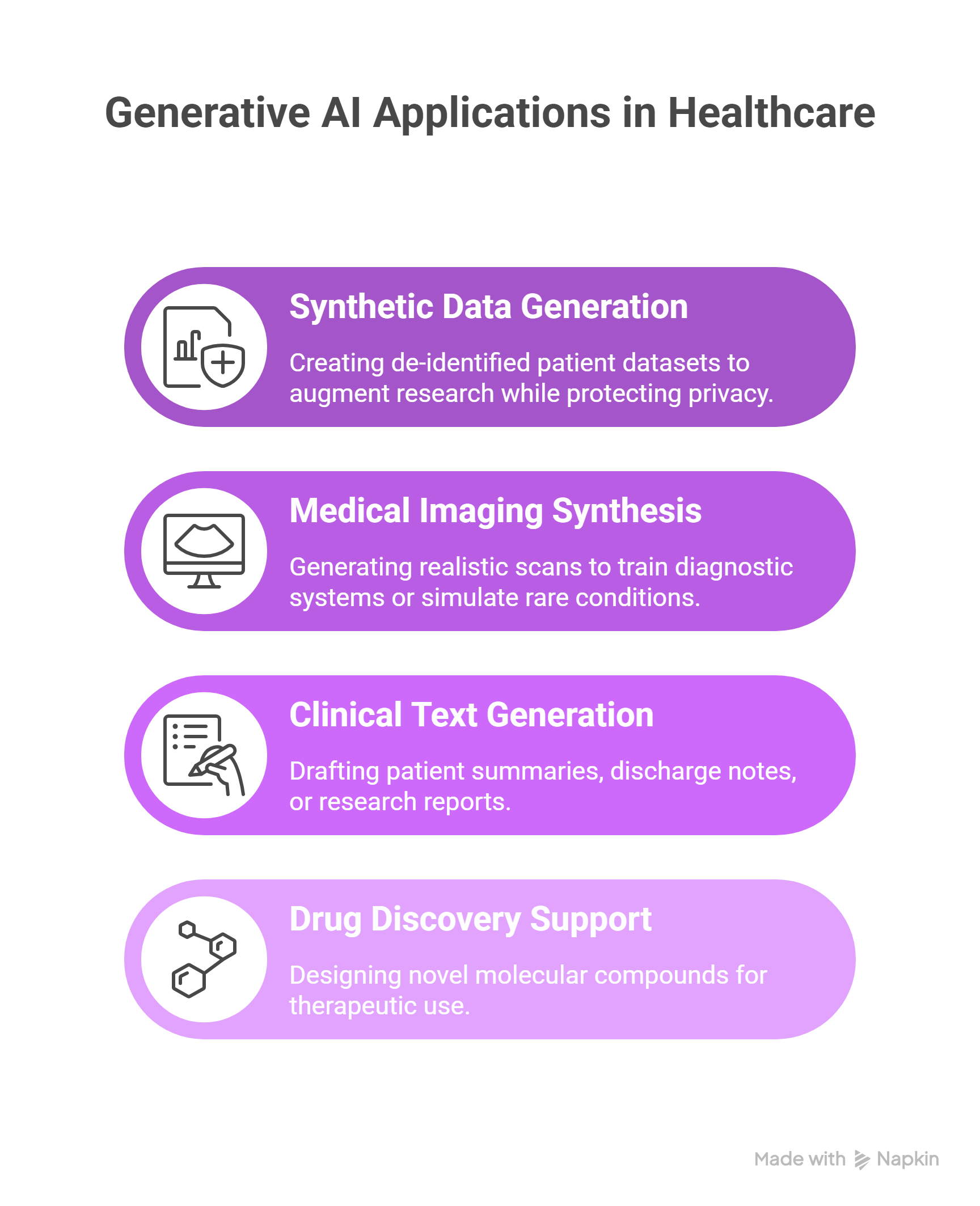How is generative AI reshaping healthcare?
Generative AI is emerging as a transformative force in healthcare, enabling new approaches to diagnostics, research, and personalized medicine. Unlike traditional AI models, which classify or predict, generative AI creates novel outputs, whether images, text, or molecular structures, based on learned patterns from massive datasets. This capability allows it to assist clinicians in interpreting medical data, accelerate research discoveries, and open new avenues for patient care.
Healthcare systems face increasing complexity: more data, rising costs, and greater demand for precision medicine. Generative AI addresses these challenges by making information more accessible, insights more scalable, and solutions more personalized.
What is generative AI in healthcare?
Generative AI refers to machine learning models that produce new data resembling their training input. In healthcare, this means:

How does generative AI enhance diagnostics thought synthetic data?
Generative AI augments diagnostic workflows by:
- Imaging Augmentation: Synthesizing additional radiology or pathology images to improve model training and reduce bias.
- Data Imputation: Filling gaps in incomplete imaging or clinical datasets.
- Rare Condition Simulation: Producing synthetic examples of rare diseases, helping clinicians and AI models recognize less common pathologies.
These applications enhance diagnostic accuracy and reduce time spent on repetitive reporting tasks, freeing clinicians to focus on interpretation and patient care.
How is generative AI advancing medical research?
Generative AI accelerates discovery and innovation across several research domains:
- Drug Discovery: AI models generate and evaluate potential drug molecules, reducing the cost and time of early-phase R&D.
- Genomics: Generative models help predict gene expression patterns and simulate genetic variants to study disease mechanisms.
- Clinical Trials: Synthetic patient data is used to test trial designs, ensuring diversity and minimizing bias.
- Knowledge Synthesis: LLMs analyze vast biomedical literature to summarize evidence, highlight trends, and suggest hypotheses.
These capabilities empower researchers to process more data, generate novel hypotheses, and bring therapies to market faster.
What role does generative AI play in personalized medicine?
Generative AI supports precision healthcare by tailoring interventions to individual patients:
- Treatment Recommendations: LLMs generate tailored summaries of treatment options based on patient history and guidelines.
- Predictive Modeling: Generating patient-specific outcome scenarios to aid clinical decision-making.
- Patient Engagement: Conversational AI provides personalized health education and follow-up support.
Together, these applications enhance patient-centered care, ensuring treatments are optimized for individual needs.
What challenges must be addressed?
While promising, generative AI introduces risks that must be managed carefully:
- Explainability: Outputs must be interpretable and clinically validated.
- Bias: Synthetic data may amplify existing disparities if training datasets are unrepresentative.
- Regulation: Compliance with FDA, HIPAA, GDPR, and EU AI Act standards is essential for safe deployment.
Healthcare organizations must adopt transparency measures, robust validation, and human-in-the-loop oversight to ensure responsible use.
What does the future hold for generative AI in healthcare?
The future of generative AI in healthcare points to greater integration and innovation:
- Multimodal Generative Models: Combining text, imaging, and genomic data for holistic analysis.
- Federated Learning Approaches: Training generative models on distributed datasets without moving sensitive patient data.
- Regulatory-Grade Tools: Transparent, auditable systems supporting clinical trials and FDA submissions.
- Scalable Deployments: Cloud-based, explainable generative AI pipelines available for healthcare providers of all sizes.
John Snow Labs is advancing generative AI with explainable, domain-specific models designed to meet clinical, operational, and regulatory needs.
Why is generative AI a game-changer for healthcare?
Generative AI is more than a technological advancement, it’s a paradigm shift. By enhancing diagnostics, enabling precision research, and supporting personalized care, it brings new efficiency and scalability to healthcare systems. The combination of advanced generative models with transparent, validated, and compliant pipelines ensures safe and impactful adoption.
Healthcare leaders interested in deploying generative AI should explore domain-specific solutions that balance innovation with responsibility. Schedule a free demo call to learn how we can help bring generative AI into your workflows.
FAQs
What is synthetic data in healthcare?
Synthetic data is artificially generated patient data that mimics real-world datasets while protecting patient privacy.
How does generative AI help radiology?
It creates synthetic images for rare conditions, fills gaps in datasets, and drafts reports from imaging studies.
Can generative AI speed up drug discovery?
Yes. It generates and evaluates novel molecular structures, helping researchers identify promising drug candidates faster.
Is generative AI safe for clinical use?
When validated, monitored, and deployed with robust human oversight, generative AI can safely help humans during diagnostic and research activities.
What regulations apply to generative AI in healthcare?
AI systems must comply with FDA GMLP, HIPAA, GDPR, and the EU AI Act, depending on region and application.
Supplementary Q&A
How does generative AI improve clinical trials?
By generating synthetic patient populations, AI helps researchers test trial designs, improve simulated cohort diversity, and anticipate potential challenges before real-world execution.
What is the role of multimodal generative AI?
It integrates text, imaging, and genomics to provide holistic insights, supporting both diagnostics and personalized treatment planning.
How can bias in generative AI be mitigated?
Through diverse training datasets, fairness-aware model design, continuous monitoring, and decentralized clinical validation.




























